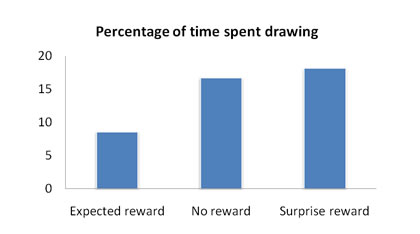Jesse Schell’s “Future of Games” talk at DICE is getting a good deal of buzz and discussion.
So here are a few thoughts: The second half of Schell’s talk centers on external reward systems such as the Xbox Live achievement system, and he describes a possible future (that he appears somewhat ambivalent about) in which everything – TVs, toothbrushes, pianos, cars, schools are designed as game-like systems that constantly reward you with points for various actions. Such as, well, brushing your teeth.
Schell’s basic argument is that external rewards are an incredibly strong psychologically motivator.
Yes and no. If you think about the car that gives you points for a mundane activity such as driving fuel-efficiently, then certainly external rewards can work as a motivator.
But I think that Schell a.o. overlook that external rewards are also known to be strong demotivators. A famous 1973 experiment (“Undermining children’s intrinsic interest with extrinsic reward“) showed that when nursery school children consistently received external rewards for drawing, they lost interest in drawing and began drawing less.
Here’s the graph from a write-up of the results that also mentions similar studies of adults. (Expected reward = consistently receiving a reward for drawing.)

But how can that be? Aren’t rewards motivating? Not necessarily, because rewards may trick you into forgetting your original motivation. You think you like drawing, but when you are consistently showered with rewards for doing it, you start thinking that you are really in it for the rewards …
Marc LeBlanc once pointed me to the business book Punished by Rewards: The Trouble with Gold Stars, Incentive Plans, A’s, Praise, and Other Bribes. From the book description:
Promising goodies to children for good behavior can never produce anything more than temporary obedience. In fact, the more we use artificial inducements to motivate people, the more they lose interest in what we’re bribing them to do. Rewards turn play into work, and work into drudgery.
As you can see, this is completely at odds with the argument that Schell is making. I can’t claim to be an expert on the psychology here, but it does seem that external rewards may have a kind of reversal effect: If you dislike the activity, external rewards make it more attractive, but if you like the activity, external rewards make it less attractive.
So one theory to use could be Michael Apter’s Reversal Theory, according to which we switch between telic (focused on external goals) and paratelic (focused on immediate enjoyment) states. Hence the introduction of an external reward will switch us from the paratelic state where we are enjoying a task, to the telic state where we are performing a task for external rewards.
On a more personal note: I sometimes hear of universities that want to reward researchers for publishing papers or talking to the media. This always strikes me as unpleasant because it discounts the pride that we (hopefully) have in our research. If we started to do research only for the external rewards, our productivity would surely drop.
And that, my friends, is why external rewards can be demotivating.













